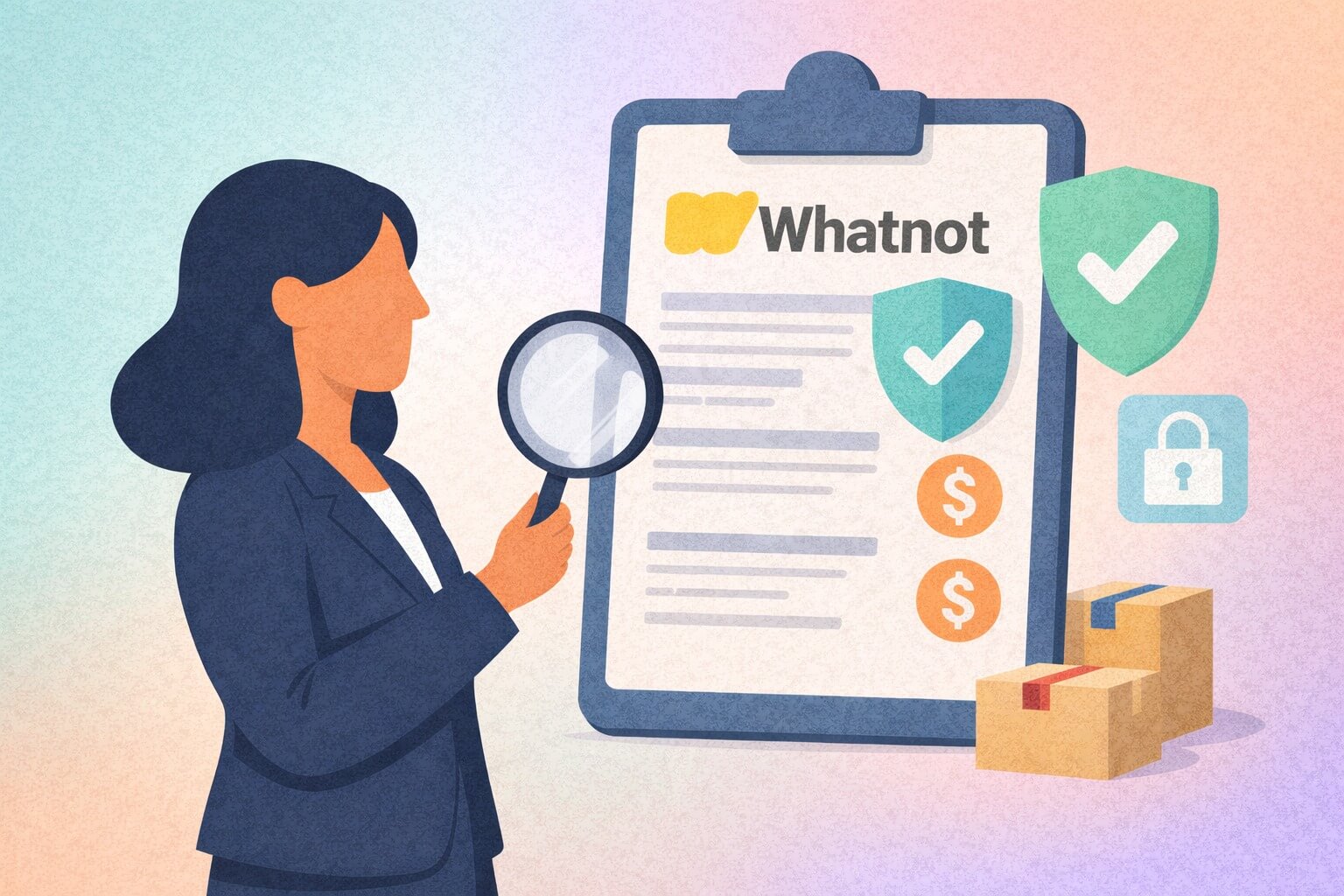Flyp vs. Vendoo vs. Nifty: Full feature showdown

Flyp, Vendoo, and Nifty are three very separate crosslisting and automation tools.
Flyp appeals to beginners and budget sellers, offering one pricing tier at $9/month. Vendoo is designed for individuals looking to crosslist on 11 platforms, whereas Nifty offers tailored features for both small sellers and those with extensive inventory.
But each platform offers different automation crosslisting capabilities and AI features. We’ll compare the different capabilities of each tool to help you select the best one to more items from your closet.
Flyp vs. Vendoo vs. Nifty: At a glance
Choose Flyp if you’re new to crosslisting and want basic features with free initial access, but don't mind manual listing creation and limited automation.
Choose Vendoo if you're a casual seller managing under 100 listings who wants broad marketplace access. However, expect to pay extra for the most useful features through add-ons.
Choose Nifty if you want a platform that runs 24/7 in the cloud, AI-generated listing descriptions, titles, and hashtags from photos, and updates inventory across platforms in just a few clicks.
Meet the contenders
Flyp: Best for cheap crosslisting
Flyp operates as a Chrome extension crosslisting tool for managing inventory across Poshmark, Mercari, Facebook Marketplace, eBay, and Depop. It also offers an iOS app, but it’s designed for connecting resellers with professional sellers rather than crosslisting.
Currently, Flyp only has one pricing option, at $9/month, which starts after a 100-day free trial.
Vendoo: Best for beginners
Vendoo suitable. It supports crosslisting across 11 marketplaces, which we’ll cover below in detail. The tool offers affordable entry pricing but limits features based on subscription tier.
Vendoo monthly pricing
Vendoo add-ons, monthly pricing
Nifty: Best for crosslisting and bulk updates
Nifty offers a crosslisting solution for sellers of all sizes. It’s a cloud-based SaaS (software as a service), so the tool doesn’t always need to run on an open tab. The tool’s one-click bulk importing features simplify managing marketplace inventory without requiring manual setup.
Monthly pricing
Flyp vs. Vendoo vs. Nifty: Feature breakdown
Crosslisting & delisting
Flyp
Flyp supports crosslisting across Poshmark, eBay, Mercari, Facebook Marketplace, Depop, and Etsy through its Chrome extension, which must stay open in the background. The platform handles basic inventory distribution, but doesn’t automatically detect sales.
When items sell on any marketplace, sellers must manually mark items as sold within Flyp to trigger delisting across other platforms. This manual process can lead to overselling if updates are missed.
The system works well enough for casual sellers with inventories of around 100 items, but it becomes difficult for higher-volume operations that need automation to maintain inventory accuracy.
Vendoo
You use Vendoo to crosslist items on eBay, Depop, Mercari, Poshmark, Grailed, Etsy, Facebook Marketplace, Shopify, Vinted, Vestiaire Collective, and Whatnot. Although this list seems extensive at first, Vendoo only supports crosslisting on 3 marketplaces of your choice, which is fewer than many Vendoo competitors.
So, if you want to crosspost to 4 or more marketplaces, you’ll need to purchase the add-on.
When it comes to delisting, Vendoo only automatically detects sales and delists across 5 marketplaces. Want to bulk delist across more platforms? You’ll need to pay for yet another add-on.
Nifty
Compared to Flyp and Vendoo, Nifty delivers more crosslisting and delisting functionality per marketplace. It supports unlimited crosslisting across Poshmark, eBay, Mercari, Depop, and Etsy, with additional marketplaces coming soon.
Nifty also detects sales and automatically delists duplicate listings across multiple marketplaces. You won’t need to put in any manual effort or purchase any add-ons.
The verdict
Nifty stands out as the strongest option for crosslisting and delisting. Unlike Flyp, it doesn’t require manual updates or need to stay open in a tab. You also won’t need to worry about purchasing costly add-ons, unlike Vendoo.
When you go with Nifty, you get unlimited crosslisting across popular marketplaces and fully automated delisting when items sell, which prevents overselling and saves time. This makes Nifty a better choice for both casual sellers and high-volume resellers who need reliability and scalability without added costs, extra steps, or unnecessary frustration.
Bulk importing and listing creation features
Flyp
Flyp provides basic inventory management through bulk importing, allowing you to import listings from supported marketplaces and then crosslist them to others. However, these features are standard among crosslisting tools.
Unlike some competitors that are beginning to introduce AI listing generation, Flyp doesn’t use AI to create titles, descriptions, or tags from photos. Sellers must produce their own listing content before crosslisting.
Vendoo
Vendoo connects to 11 marketplaces, making it a practical choice for multichannel resellers. It supports bulk importing from connected marketplaces and crosslisting across all of them.
Its AI features are limited compared to newer competitors, offering only basic AI assistance to generate titles and descriptions. Since it lacks tone customization, advanced SEO optimization, and automatic tag generation, you’ll still need to manually create most of your listing content.
Nifty
Nifty offers unlimited bulk importing and crossposting, making it a strong option for sellers with any closet size. Its AI is more advanced than many competitors, capable of generating listings directly from photos with minimal user input.
The AI creates SEO-optimized titles, detailed descriptions, and relevant hashtags, and sellers can choose different writing tones to fit their brand. In addition to listing creation, Nifty supports scheduled relists and Poshmark automation features like following and sharing.
The verdict
Nifty’s AI-listing tools propel it above both Flyp and Vendoo. Flyp offers no AI generation capabilities, and Vendoo provides basic title and description generation. Nifty blends SEO, hashtag generation, and AI tone adjustments to emerge as the superior choice.
Analytics & reporting
Flyp
Flyp provides simple analytics through its dashboard, allowing sellers to monitor listing views, shares, and sales activity across connected marketplaces. These tools give a clear picture of basic performance, especially for Poshmark users who rely on sharing activity to drive visibility.
The reporting is limited compared to more advanced platforms. It doesn’t include profit margin analysis, cost of goods tracking, or detailed comparisons between marketplaces. As a result, sellers receive surface-level insights that help monitor activity but don’t provide deeper business intelligence.
For casual sellers with smaller inventories, Flyp’s basic reporting is usually sufficient without adding unnecessary complexity.
Vendoo
Vendoo provides more in-depth analytics than Flyp, offering breakdowns of performance across all connected marketplaces. The system tracks listing activity, sales results, and platform-specific trends to help sellers see where their products perform best.
The tool also includes basic profit tracking, but it doesn’t offer extra fields like mileage tracking to help prepare accurate tax documents. Its dashboard presents data in visual formats that make trends easier to identify.
Nifty
Nifty’s analytics suite provides an in-depth view, giving you a snapshot of your closet’s performance across connected marketplaces. It includes profit tracking, fee calculations, interactive charts and graphs, and performance insights.
The system extracts marketplace fees, shipping costs, and transaction data to provide accurate margin calculations without manual entry.
The analytics features identify best-selling products, slow movers, and pricing opportunities through data analysis. You’ll receive reports to track your expenses and profits for tax document preparation.
The verdict
Nifty leads the analytics and reporting comparison with automated insights that minimize manual data entry. Vendoo offers broader marketplace coverage, but its tiered pricing model restricts access to advanced analytics for sellers on lower plans. Flyp offers basic tracking suitable for casual users, but it falls short for data-driven businesses.
Pricing & value
Flyp
Flyp offers the cheapest pricing at $9/month, features a 100-day free trial, followed by a flat $9/month. However, the low price reflects value, particularly in AI automation and advanced analytics capabilities. Sellers trading cost savings for functionality may find Flyp suitable for entry-level needs, but limiting for business growth.
The tool offers value to small-scale, budget-conscious sellers who need basic crosslisting functionality.
Vendoo
Vendoo structures its pricing across multiple tiers starting at $8.99/month. However, this entry-level plan only lets you crosslist up to 25 items. Because Vendo limits the number of items on each pricing tier, most users subscribe to the $69.99/month plan for unlimited items.
Overall, Vendoo isn’t as cheap as it appears if you’re looking for value.
Nifty
Nifty charges $39.99/month for crosslisting, allowing for unlimited listing across marketplaces with 500 AI-generated listings. The $59.99 plan supports unlimited items and 1,000 AI-generated listings.
The tool’s $39.99 automation plan includes sharing, following, and relisting on Poshmark. This tier also provides unlimited listings and relisting on Mercari, Depop, and eBay. If you only sell on either Poshmark or eBay, you can get automation for $25/month per platform.
Need both crosslisting and automation? Nifty’s $69.99/month version has you covered, combining all features of the automation and crosslisting plans. If you need to support unlimited items and AI-generate 1,000 listings, go with the $89.99/month version.
Nifty offers value to nearly any seller, from the casual beginner and dedicated hustler to full-time resellers with over 1,000 items.
The verdict
Nifty delivers the best value through better features and transparent pricing. Vendoo falls short due to its very low item allowance per tier. Although Flyp offers affordability, it lacks powerful automation tools compared to other features.
With generous listing allowances, automation, and AI-generation features, Nifty offers enough features that allow you to move more items, paying for itself.
What Real Users Say
We sourced comments from real users from Reddit, Trustpilot, and YouTube to illustrate each platform’s strengths and weaknesses. Discover what users are saying about each platform:
Flyp pros
- Flyp offers better value than Vendoo: One user noted they prefer Flyp over Vendoo, criticizing Vendoo for excessive extra charges. (April 19th, 2024)
- Affordable and simple: A user highlighted that Flyp is cheap and straightforward. Although basic, it reliably handles crosslisting tasks. (August 5th, 2026)
Flyp cons
- Serious concerns about Flyp’s programming and review practices: A user shared ongoing frustrations with Flyp’s reseller tools, citing repeated errors, including a server-side coding issue when connecting to Facebook. They claimed Flyp dismissed valid concerns, accused them of rudeness, and blocked them. (May 27th, 2026)
- Poor support and unresolved Facebook issues: A reviewer warned against using Flyp, citing seven weeks of failed Facebook connectivity that cost them significant holiday sales. (May 27th, 2026)
Vendoo pros
- Easy crosslisting: A seller praised Vendoo for offering a simple platform with no learning curve, making reselling fun and easy. (August 21st, 2026)
- Vendoo delivers speed and great support: A user praised Vendoo for its speed, ease of use, and dependability. They also commended customer service for responding within minutes and quickly resolving issues. (September 2nd, 2026)
Vendoo cons
- Buggy and glitchy: A Vendoo user complained that the tool gave them constant headaches by glitching and crashing for over a year. They also had problems crosslisting their items from Vendoo to different marketplaces. (July 31st, 2026)
- Lack of refund support: One reviewer shared frustration with Vendoo after being charged despite selecting “remind me later” on a cancellation offer. They argued the company should track this information without burdening customers. (September 7th, 2026)
Nifty pros
- Strong automation and listing functions: A Nifty user praised the tool’s fast setup and crosslisting capabilities. They also found the AI-generation features convenient. (June 14th, 2026)
- Well developed with strong reviews: Reviewers noted that Nifty is fairly new but actively developed, with positive feedback pointing to its steady improvements and promising potential as a modern crosslisting tool. (August 5th, 2026)
Nifty cons
- Higher price point (but worth it): A new reseller recommends Nifty even though some of the pricing tiers are at a higher price point. (March 1st, 2026)
- Shipping and return setups: A YouTuber noted that you need to manually set up your default for shipping and returns policies. (June 14th, 2026)
My final verdict: Which tool should you choose?
Picking the right crosslisting tool depends on your workflow and growth goals. Nifty excels for both small and large sellers, experienced or inexperienced, whereas Flyp and Vendoo appeal to newbies. Select a tool based on the following:
Choose Nifty if you …
- Want effortless crosslisting: Its cloud-based design removes repetitive tasks and keeps your inventory updated across platforms without constant manual effort.
- Need bulk control: Manage and edit hundreds of items at once when selling across multiple marketplaces.
- Need AI-generated listings to save time: Generate optimized listings from photos in seconds with built-in AI tools.
Choose Flyp if you …
- Need a budget-friendly option: Flyp is cheaper than many competitors while still giving you essential crosslisting features.
- Want an extended free trial: Most crosslisting tools provide a 7-day free trial, but Flyp gives you 100 days, payment-free.
- Prefer straightforward functionality: Flyp offers simple software that reliably handles core crosslisting tasks without extra complexity.
Choose Vendoo if you …
- Need easy onboarding: Vendoo works well for beginners with smaller inventories, offering a clean and intuitive setup.
- Have very few listings: Plans begin at $8.99/month for only 25 listings and increase only as your active listings grow.
- Want maximum coverage: Vendoo supports 11 marketplaces, including specialty platforms like Vestiaire Collective and Whatnot.
Sellers with under 50 listings who don’t plan on scaling should try Vendoo, while those looking to save money and don’t care about functionality might want to try Flyp. However, sellers with over 50 listings who wish to save time with AI-generation features should pick Nifty.
Ready to try Nifty?
Comparing Flyp vs. Vendoo and deciding if you need more features? Go with Nifty. You can crosslist to 5 different platforms (more coming soon!) and access AI-generation and bulk update and editing features that Vendoo and Flyp can’t match. Here’s why you should try Nifty:
- Create listings from photos: Upload an image and Nifty’s AI instantly generates a full listing with SEO-ready titles, detailed descriptions, and hashtags.
- Crosslist to 5 marketplaces: Publish on Poshmark, eBay, Mercari, Depop, and Etsy in seconds, with inventory updating to avoid double-selling. More marketplaces are on the way!
- Automate your workflow: Relist, share, schedule posts, and update prices in bulk automatically, removing repetitive manual tasks.
- Edit photos like a pro: Use built-in Photoroom tools for background removal, cropping, and filters to make every listing stand out.
After just a few weeks, Nifty will pay for itself. See how it can save you time so you can connect with more buyers and try your 7-day free trial today.
FAQs
1. Which platform is best for beginners?
Nifty is the best platform for beginners because it offers bulk editing and AI features that eliminate manual work. Nifty provides unlimited crosslisting, automatic delisting across marketplaces when items sell, and AI-generated listings from photos, unlike other platforms that require add-ons or jumping between tabs. But, Flyp is good for beginners on a budget, with pricing starting at $9/month after the 100-day free trial.
2. Which tool offers the most automation?
The tool that offers the most automation is Nifty. It’s a cloud tool that automates listing creation through AI photo analysis, handles delisting when items sell, manages bulk updates and relisting, and runs Poshmark sharing and following in the background. Nifty's automation operates continuously without requiring open browser tabs or user oversight.
3. Which is the most affordable multi-channel listing software?
The most affordable multi-channel listing software is Vendoo, which has a free plan (5 listings + 3 background removals per month), with paid plans starting at $8.99/month. However, while the lowest-tier pricing is cheap, the features are sparse. You’ll only be able to import and crosslist up to 25 items, making this pricing tier viable only to small-closet sellers and beginners.





